
Resolve Your Apple iPhone 8 Keeps Asking for Outlook Password

Resolve Your Apple iPhone 8 Keeps Asking for Outlook Password
Individuals and organizations use a diverse range of mail platforms to exchange information. Gmail, Outlook, or any alternative service is consistently utilized. While email platforms have revolutionized communication, they aren’t present without their challenges. Users often encounter issues that range from sync errors to authentication problems.
Among these challenges, iPhone users specifically grapple with a persistent issue. It often appears as “iPhone keeps asking for Outlook password.” This issue disrupts the user experience and raises security concerns. To address this problem, this guide presents a detailed guide featuring effective fixes.

Part 1. Why Does My iPhone Keep Asking for Outlook Password
The iPhone asking for Outlook password arises from a combination of factors. Understanding these reasons is crucial in diagnosing and resolving the problem effectively:
1. Incorrect Password Entry
Users might unknowingly enter the wrong password. They may have changed their Outlook password without updating it on their iPhones. This mismatch can trigger continuous password prompts.
2. Outdated Mail App
An outdated Outlook mail app on your Apple iPhone 8 may struggle to communicate with its latest security protocols. This can lead to performance issues like the Apple iPhone 8 keeps asking for passwords.
3. Network Connectivity Issues
Upholding a stable internet connection is necessary for effortless communication. An unreliable or unstable network can disrupt the synchronization process in Outlook.
4. Corrupted Email Account Profile
A corrupted email account profile on the Apple iPhone 8 can cause disruptions during the authentication process. Resetting the email account on the Apple iPhone 8 device might be necessary to resolve the issue.
5. Third-Party App Interference
Other mail applications installed on the Apple iPhone 8 can also cause an issue. They might interfere with the Outlook app’s proper functioning. Identifying and temporarily disabling such apps can help diagnose and resolve the issue.
6. Excessive Email Fetching
Configuring the Outlook mail app to fetch emails too frequently causes the issue. It can strain the connection with Outlook servers, leading to authentication challenges. That causes issues like the Apple iPhone 8 asking for a password.
7. iOS Software Glitches
The smooth functioning of the Mail app may be disrupted by problems and malfunctions present in the iOS software. Compatibility issues could emerge if your device is not operating on the latest iOS version.
Part 2. [Fixes] Solve iPhone/iPad Keeps Asking for Outlook Password
Now that we have explored why the iPad keeps asking for an Outlook password, it is time for practical solutions. These 13 fixes discussed below are designed to address the root causes comprehensively:
Fix 1. Add Password Once and Let the Prompt Disappear
If your Apple iPhone 8 continuously prompts you for the Outlook password, a simple solution is to re-enter the password. Follow these steps to potentially resolve the issue once and for all by accessing the respective settings:
- Step 1. You begin by accessing your iDevice’s “Settings” app and scrolling down to tap the “Mail” option. Next, press “Accounts,” and on the following screen, select the Outlook account.

- Step 2. Encountering the error message “Account not authenticated” is what you will come across. Now, tap the “Re-enter Password” option to enter your correct Outlook password.

Fix 2. Change the Password to Your Outlook Mail
Sometimes, the email service provider may force users to change their passwords for security reasons. There is a chance that it is why your iPhone asks for an Outlook password. To modify your Outlook password from the desktop platform, adhere to the following steps:
- Step 1. Open your preferred web browser and go to the Outlook login page. Sign in to your Outlook account, locate, and click on your profile picture in the upper-right corner. There, click “My Profile,” and on the next screen, tap “Change Password” near the upper right corner.

- Step 2. Upon reaching the verification page, provide your password and tap the “Sign In” button. Afterward, you will be asked for other verification methods. Upon verifying, the “Change your password” window will appear. Here, you will need to enter your “Current password,” “New password,” and re-enter it to proceed. Then, hit the “Save” button, and your password will be changed.

Fix 3. Checking the Network Connection
Network inconsistencies can often disrupt the authentication process. This can be the leading cause behind persistent password prompts. To ensure a stable connection, ensure that you are connected to a reliable and stable Wi-Fi network. You can also try toggling the Wi-Fi and mobile data switches on and off.
Another way to confirm if network errors are the problem is to try enabling Airplane Mode. After a while, disable the Airplane Mode and check if the issue is resolved.

Fix 4. Using the Mail Toggle as a Remedy
A strategic approach to resolving authentication issues involves using the Mail toggle. You can use it to disable and re-enable the email services. This action essentially resets the Outlook app’s connection and can be performed as follows:
- Step 1. Within your Apple iPhone 8’s “Settings” app, scroll down and tap “Mail.” On the following screen, press “Accounts” and choose the “Outlook” account.

- Step 2. Here, you will find the toggle switch for “Mail.” Now, turn off the email service and wait for a few moments. Toggle the switch back on to re-enable the email service.

Fix 5. Delete and Re-Insert Outlook Account
Deleting and re-inserting your Outlook account on your Apple iPhone 8 can provide a fresh start to the email integration. Follow these steps if the persistent iPhone keeps asking for an Outlook password:
- Step 1. Navigate to the “Mail” tab within the “Settings” app on your Apple iPhone 8, and choose “Accounts” to observe the roster of email accounts. Here, tap on your Outlook account, and the following screen, press “Delete Account.”

- Step 2. Once you have deleted the account, return to the “Accounts” tab. Select “Outlook.com” after tapping on “Add Account.” Now, follow the on-screen instructions to re-enter your account details.

Fix 6. Re-Check Sync Settings
Ensuring that your sync settings align with Outlook’s recommended configurations is crucial. Follow these steps to re-check and adjust your sync settings on your Apple iPhone 8:
- Step 1. After accessing the “Mail” tab within the Settings app, tap “Accounts.” Here, find and choose the “Fetch New Data” option, followed by selecting the “Outlook” account.

- Step 2. Confirm that the “Push” or “Fetch” settings are configured to your preference. “Push” enables real-time updates, while “Fetch” allows you to set specific intervals for email updates.

Fix 7. Uninstall and Re-Install Outlook App
Is the Outlook app generally showing a lot of glitches on your Apple iPhone 8? If yes, uninstalling and then re-installing it can address potential “iPhone**/iPad keeps asking for Outlook password”** issues:
Instructions: On your Apple iPhone 8’s home screen, navigate to the Outlook mail app. Long-press the Outlook app icon and choose “Remove App” from the pop-up menu. Then, tap “Delete App” and follow it by pressing “Delete” to uninstall the app. Afterward, access the App Store and download the Microsoft Outlook app again.

Fix 8. Update iOS From Settings
Outdated iOS versions can contribute to compatibility issues and glitches. This can affect the proper functioning of the Mail app and its integration with Outlook. Follow these steps to ensure your iOS is up to date:
Instructions. Access your device’s “General” settings from the Settings app. Tap “Software Update” on the next screen and check if an update is available. Tap “Install Now” to kick-start the iOS updating process if an update is available. Make sure your device is adequately charged and maintains a stable internet connection.
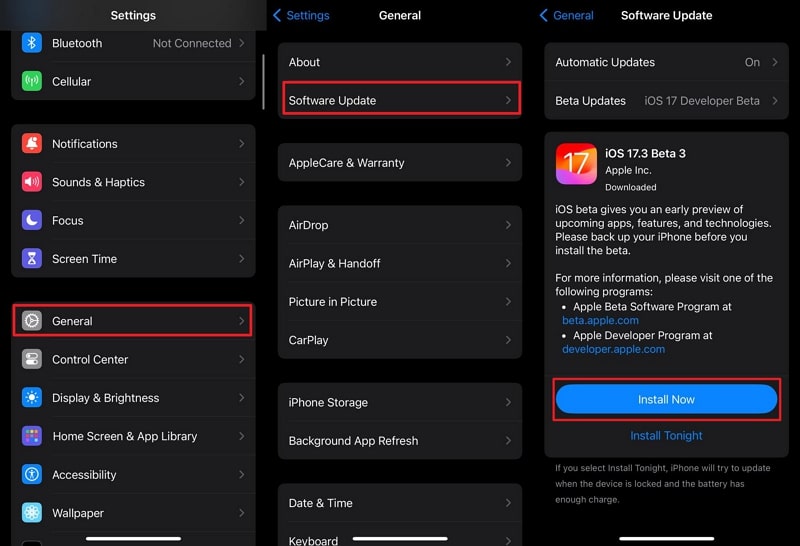
Fix 9. Try Other Alternatives to Outlook
Exploring alternative mail applications may offer a viable workaround. This is especially true if the iPhone asking for the Outlook password proves resistant to previous solutions. Consider using other email platforms such as Apple Mail, Gmail, and Yahoo Mail. This solution might not directly resolve the issue with Outlook. Yet, an alternative can provide a temporary workaround until a solution is found.
=

Fix 10. Try Disabling Privacy Protection
Certain privacy protection features on your Apple iPhone 8 may interfere with the integration of Outlook. To troubleshoot this, consider temporarily disabling privacy protection settings:
Instructions. On your Apple iPhone 8, access “Mail” settings through the Settings application. Now, scroll down to find and tap the “Privacy Protection” option in the “Messages” section. Next, you will come across the “Protect Mail Activity” switch. Here, toggle off the switch to check if it is resolved.

Fix 11. Reset All Settings of the iPhone
If the persistent password prompts remain unresolved, resetting all settings on your Apple iPhone 8 can be the solution. It acts as a comprehensive solution to potential configuration issues. This action does not erase your data but resets system settings to default. To reset all settings on your Apple iPhone 8, you can follow these steps:
- Step 1. Navigate to the “General” tab in the “Settings” app on your Apple iPhone 8 after you open it. Move down the screen, and at the bottom, choose “Transfer or Reset iPhone.”

- Step 2. On the following screen, tap “Reset” and select “Reset All Settings” from the available options. Enter your device passcode if prompted and confirm the action by selecting “Reset All Settings” again.

Fix 12. Add an Account by Switching to IMAP
In some cases, switching the account type to IMAP during the setup process can help resolve issues. For many users, it has worked to resolve issues related to Outlook password prompts. Follow these steps to add your Outlook account using the IMAP protocol:
- Step 1. Begin by accessing the “Settings” app on your Apple iPhone 8, then scroll down to locate and tap on “Mail.” Within this section, choose “Accounts” to display the roster of email accounts, and proceed to tap on “Add Account.”

- Step 2. Choose “Other” as the account type and select “Add Mail Account.” Enter your Name, full Outlook email address, descriptive description, and unique password, and hit “Next.”

- Step 3. Utilize the specified settings for the “Incoming Mail Server” and “Outgoing Mail Server” sections under the “IMAP” tab:
Incoming Mail Server
Hostname: imap-mail.outlook.com
Username: Your full Outlook email address
Password: Your Outlook password
Outgoing Mail Server
Hostname: smtp-mail.outlook.com
Username: Your full Outlook email address
Password: Your Outlook password
At last, hit the “Next” button at the top-right side of the screen.

Fix 13. Contact Support of Outlook To Resolve
If none of the previous fixes resolve the issue, seek help directly from Outlook Support. Outlook’s support is capable of addressing a broad spectrum of issues. It is adept at delivering personalized assistance tailored to your circumstances.
Bonus Part. Can’t Access Outlook Because iPhone Is Locked? A Quick Solution
The iPhone keeps asking for an Outlook password, which isn’t the only password-related problem. Forgetting the screen locks of their iPhones is a common phenomenon. It is especially prevalent among iPhone users. You can no longer access important Outlook emails when your Apple iPhone 8 is locked. That is where Wondershare Dr.Fone emerges as your savior. This powerful tool can bypass all types of iOS screen locks within minutes.
It can remove lock screens on your Apple iPhone 8, iPad, and iPod. You can say goodbye to the hassle of dealing with iCloud activation locks. Moreover, it helps remove your Apple ID if you have forgotten your Apple ID password. Dr.Fone allows you to bypass them effortlessly without requiring a password.
Prime Features of Wondershare Dr.Fone
- It can circumvent Mobile Device Management and screen time restrictions without data loss.
- This tool completely supports the most recent iOS 17, iPadOS 17, and iPhone 15.
- Additionally, this software effortlessly bypasses carrier locks on your Apple iPhone 8.
Steps To Unlock Your Apple iPhone 8 via Wondershare Dr.Fone
Unlocking your Apple iPhone 8 using Wondershare Dr.Fone is a straightforward process. That is made possible with its intuitive interface and a simple 3-step procedure. You can use the following steps to bypass your Apple iPhone 8’s screen lock within minutes:
- Step 1: Access Screen Unlock by Launching Dr.Fone
Once you’ve launched Dr.Fone on your computer, go to Toolbox. Here, tap “Screen Unlock” and choose “iOS.” In the opened window, choose the “Unlock iOS Screen” option to unlock your iOS device’s screen. On the subsequent screen, click “Start” to commence the iOS device unlocking process.
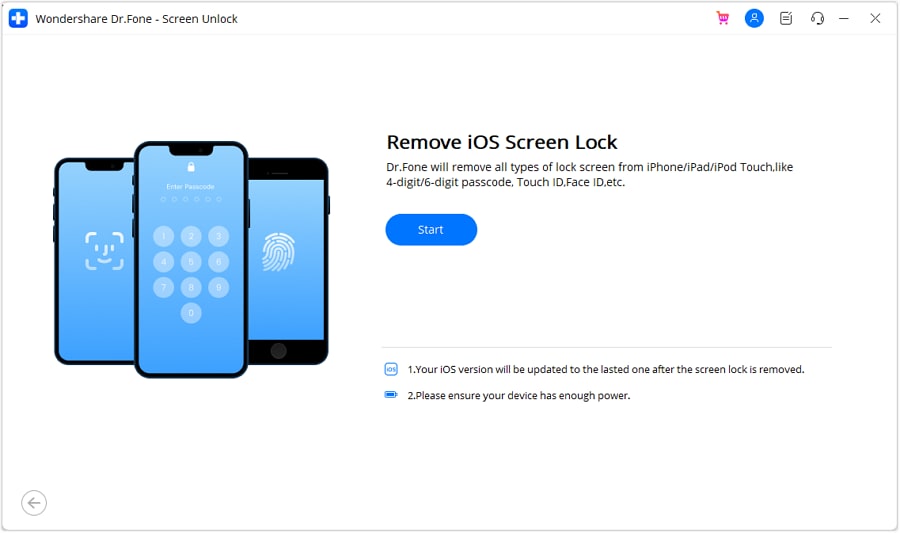
- Step 2: Initiating iPhone Recovery Mode and Device Identification
Subsequently, you need to place your Apple iPhone 8 into Recovery Mode. Adhere to the on-screen instructions corresponding to the model of your iDevice. Afterward, the tool will automatically detect the “Device Model.” If necessary, adjust the model and choose the “System Version.” Once these steps are completed, click “Start” to initiate the unlocking process.
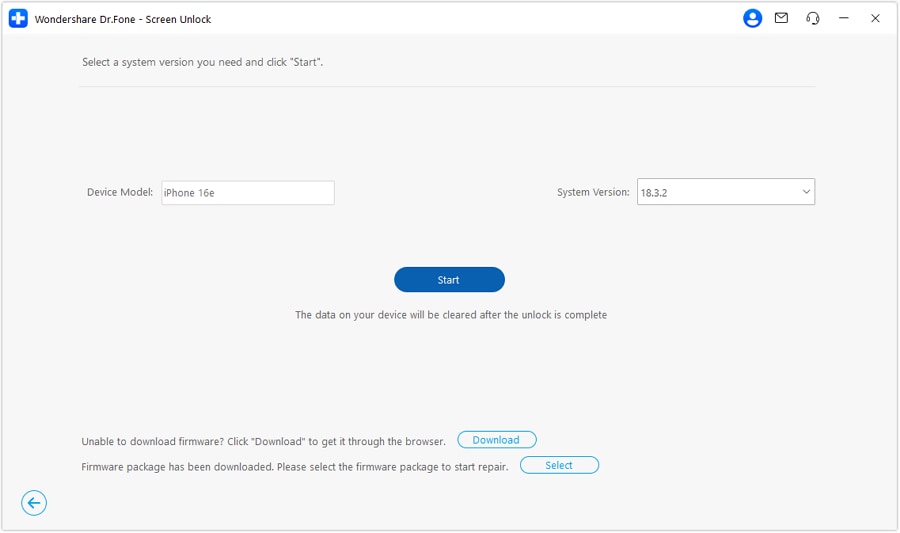
- Step 3: Finalizing iOS Device Unlock
Monitor the iOS firmware download progress on the screen. After successful download and verification, proceed by selecting “Unlock Now.” A confirmation window will appear, prompting you to input the necessary code. Enter the code and tap Unlock to proceed to the outcome. Upon unlocking the iDevice, click the “Done” button to finalize the process.
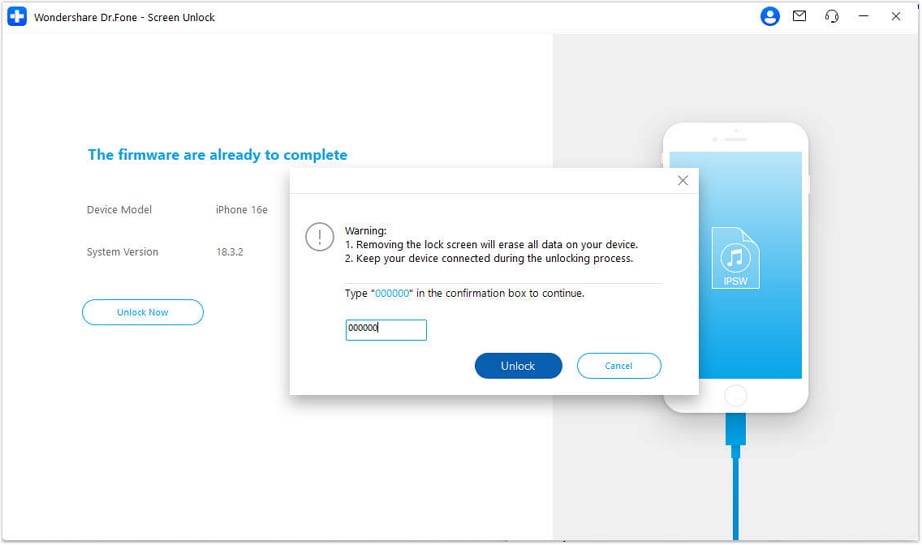
Conclusion
To summarize, resolving an iPhone asking for an Outlook password requires a systematic approach. From re-entering passwords to adjusting settings, this guide has covered 13 comprehensive fixes. For those facing the challenge of a locked iPhone, Dr.Fone offers a reliable solution. Users can ensure integration between their iPhones and Outlook by addressing these issues. This will enhance their overall email experience.
Tips: Are you searching for a powerful Screen Unlock tool? No worries as Dr.Fone is here to help you. Download it and start a seamless unlock experience!
Detailed Review of doctorSIM Unlock Service For Apple iPhone 8
IMEI unlocking frees a mobile device from the limitations imposed by its original carrier. This allows the Apple iPhone 8 device to operate with different network providers worldwide. Numerous tools and techniques exist to unlock phones. These include software-based unlocking, hardware modifications, and IMEI-based solutions.
Among these methods, doctorSIM stands out as a reliable and reputable service. While alternative operational solutions are available, IMEI unlocking remains a popular choice. Some users may find it necessary when changing carriers or traveling abroad. In this doctorSIM review, we’ll review its functions, reliability, and pros and cons.

Part 1. Understanding The Basic Mechanism Behind doctorSIM: A Review
doctorSIM is a comprehensive solution for smartphones and offers a whole lot of features. These services range from recharging mobile devices to unlocking carrier locks. When it comes to unlocking carrier locks, doctorSIM legit claims to work for any carrier anywhere worldwide. Its primary function revolves around providing users with the ability to unlock their devices.
The tool provides users with the convenience of checking if their device is blacklisted. This service extends globally and comes at a reasonable price point. Moreover, doctorSIM unlock review and unlocking solutions cater to most iOS devices and Android phones. It includes even lesser-known niche brands, offering compatibility across a wide spectrum.
Key Features of doctorSIM
- It allows you to check the SIM lock status and warranty status of your iOS device.
- doctorSIM can also help you check the iCloud Activation Lock Status and MI Account Activation Status.
- Along with the old devices, this service is also compatible with the latest models, such as the Apple iPhone 8 15 series,
Pros
- There is no need to download and install any software on the Apple iPhone 8 device.
- Jailbreaking the Apple iPhone 8 device isn’t a requirement.
- Offers a 30-day money-back guarantee.
Con
- It can take up to a week to unlock a device
Part 2. Using doctorSIM for Easy IMEI Unlocking Operations
doctorSIM unlock reviews simplify the unlocking process by leveraging the IMEI number . Here, users can submit their device’s IMEI number and relevant details. It then provides an unlocking code or instructions tailored to their device model and carrier. Below are the instructions you should adhere to to unlock your device:
- Step 1. You can start by accessing the doctorSIM website using a web browser. Here, click the “Unlock” option, and from the drop-down menu, choose your device brand, for example, “Apple.”

- Step 2. On the following screen, scroll down to choose your smartphone model, followed by your country and network carrier. Next, choose the “Service” you want to use, provide an IMEI number, agree to the terms, and click “Next.”

- Step 3. This will take you to the next screen, where you can view the “Summary” of your order. If everything is all right, press “Next” to move to payments to pay the charges via Credit Card or Crypto. Afterward, wait for the process to complete, which can take days.

Part 3. Is the Entire doctorSIM System Legit?
doctorSIM is generally regarded as a legitimate platform for unlocking mobile devices. Its legitimacy is supported by various factors, ranging from reputation to customer reviews. It has established a credible reputation within the mobile device unlocking industry. The service has been operating for several years and has garnered users’ trust.
The platform operates within the legal frameworks governing IMEI unlocking services. It adheres to regulations and ensures that the unlocking methods used are lawful. While specific reviews may vary, many users have reported positive experiences.
Customer doctorSIM reviews highlight the platform’s reliability, effectiveness, and user-friendly interface. It provides clear information about the unlocking process, associated fees, and service terms. Such effective transparency contributes to its credibility.
Part 4. Other Top Alternatives of IMEI Unlocking
It is important to clarify that doctorSIM primarily focuses on IMEI unlocking. This liberates a device from carrier restrictions to enable use with various networks. Amongst all the discussion, it is crucial to differentiate that this service does not offer iCloud Activation Lock removal in any case. Here are some top alternatives specifically that you can consider when using doctorSIM for unlocking purposes:
1. IMEIDocto
Specializing in unlocking iPhones by IMEI, IMEIDoctor is a trusted service. It offers a dependable solution for users seeking freedom from carrier restrictions. IMEIDoctor stands out further due to its extensive support for various iPhone models and carriers. It solidifies its status as a reliable choice.

2. CellUnlocker
CellUnlocker stands out as a reputable IMEI unlocking service, catering to many types of smartphones. Known for its reliability, the service facilitates unlocking for numerous carriers globally. This provides flexibility for users requiring international use of their devices. The user-friendly interface further enhances the overall experience.

3. IMEIUnlockSIM
IMEIUnlockSIM is a specialized service focusing on unlocking iPhones through IMEI. Known for its straightforward process, it aims to provide users with a hassle-free experience. This service also offers iCloud unlock and IMEI checks. The service supports a variety of iPhone and Android models and provides timely customer support.

4. iUnlockBase
This IMEI unlocking service is a comprehensive service renowned for its expansive database. It supports a large number of devices and carriers. The platform provides various unlocking services, such as network unlocking and iCloud unlocking. Serving a worldwide audience, iUnlockBase guarantees a seamless unlocking process.

Part 5. What To Do When iCloud Activation Lock Active?
Although IMEI Unlocking turns out to be quite an exceptional service, it generally is not the only thing that becomes a barrier for iPhone users. The iCloud Activation binds an Apple device to a user’s Apple ID, making itself a great security measure. It presents a unique circumstance where services such as doctorSIM legit are inapplicable. Wondershare Dr.Fone specializes in bypassing the iCloud Activation Lock.
It allows users to circumvent it without needing the Apple ID. This unique capability sets Dr.Fone apart from other solutions. Once the activation lock is removed, it grants full access to users’ devices. Dr.Fone also extends its capabilities to remove an Apple ID in cases where the password is forgotten. Its remarkable performance includes the permanent bypass of the Apple ID lock.
Notable Characteristics of Wondershare Dr.Fone
- Remove MDM or Screen Time passcodes on your device effortlessly, preserving your data.
- Wondershare Dr.Fone specializes in bypassing various screen locks, including passcodes and Face IDs.
- Fone can remove the iTunes backup encryption lock without any impact on your data.
Steps To Bypass iCloud Activation Lock via Wondershare Dr.Fone
Dr.Fone is intended for users locked out of their devices. Given below are the steps you need to follow when using Dr.Fone to bypass iCloud Activation Lock:
1. For Devices Running iOS/iPadOS 12.0 to 14.8.1
- Step 1. Installation and iCloud Activation Lock Removal
Install and launch the most recent version of Wondershare Dr.Fone onto your computer. Now, proceed to the “Toolbox” tab, navigate to “Screen Unlock” and select “iOS.” In the following window, choose “iCloud Activation Lock Removal” and click “Start” to begin the process and receive a prompt to connect your iOS device. Once connected, the window will display the progress status.
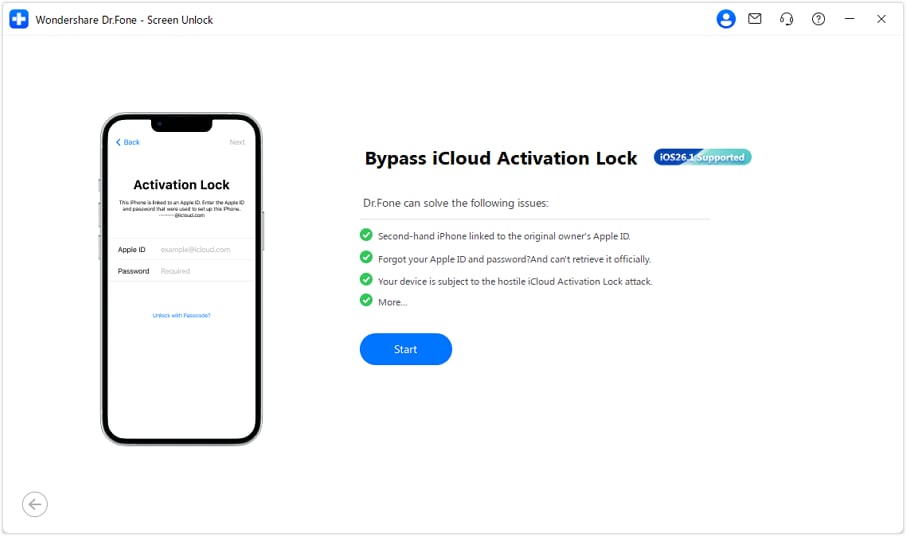
- Step 2. Device Identification and Unlock Initiation
Now, decide whether your device is GSM or CDMA, as it is an important aspect. Bypassing iCloud Activation Lock on a GSM device won’t affect the Apple iPhone 8 device. However, running this process on a CDMA device will result in a loss of cellular activities. Click “Unlock Now” to proceed further, and if your device is CDMA type, you’ll encounter a series of pointers. Go through them and click “Got It!” after agreeing with all the mentioned points.
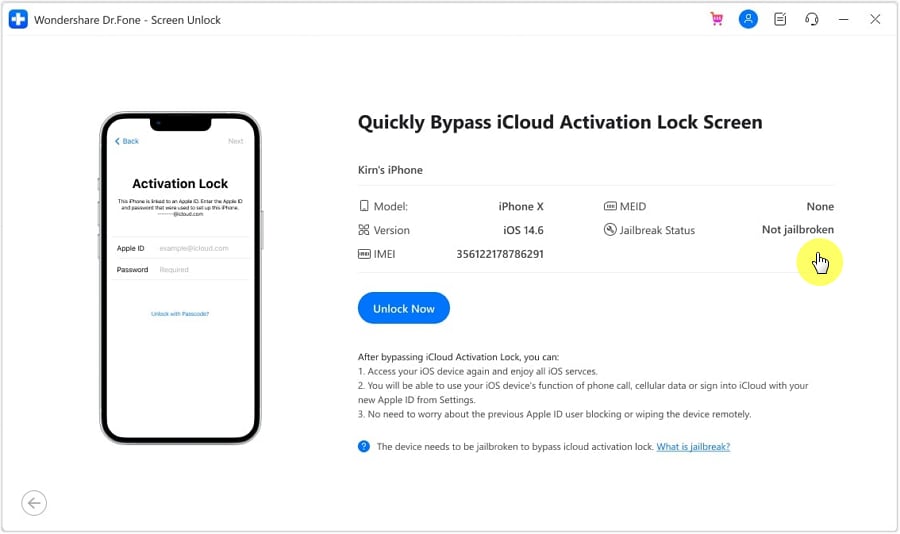
- Step 3. Jailbreaking and Activation Lock Bypass
After this, if your iDevice isn’t jailbroken, you will be required to jailbreak your device. For that, you can follow the step-by-step textual instructions or watch a video. Once the Apple iPhone 8 device is jailbroken, the process will commence automatically to bypass the Activation Lock. A completion message will pop up on the window when the process finishes. Afterward, tap the “Done” button to finalize the process successfully.
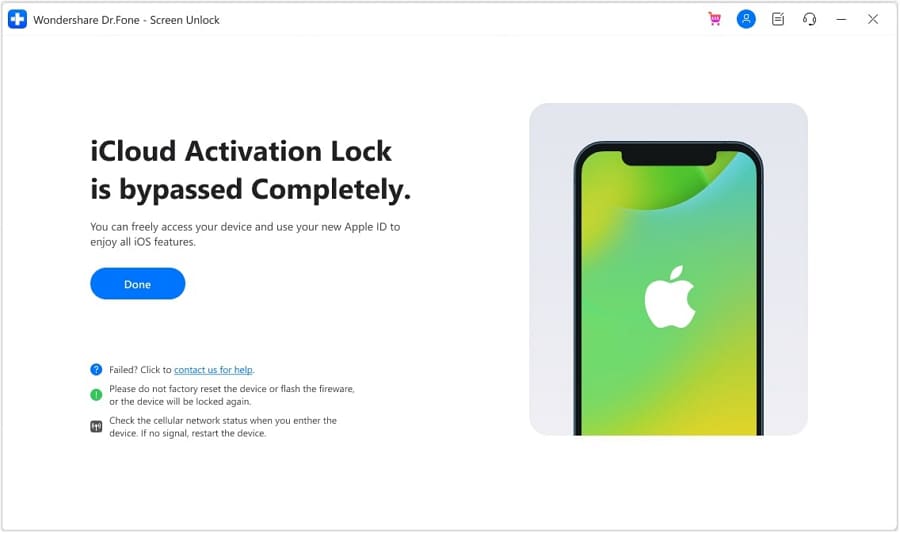
2. For Devices Running iOS/iPadOS 15.0 to 16.3
- Step 1. iCloud Activation Lock Removal Setup
On accessing the “iCloud Activation Lock Removal” page, a notification will display on the screen, alerting the user about the ongoing process. Carefully review all the information provided and select the “I have read and agree to the agreement” option. Proceed by tapping on the “Got It!” choice.
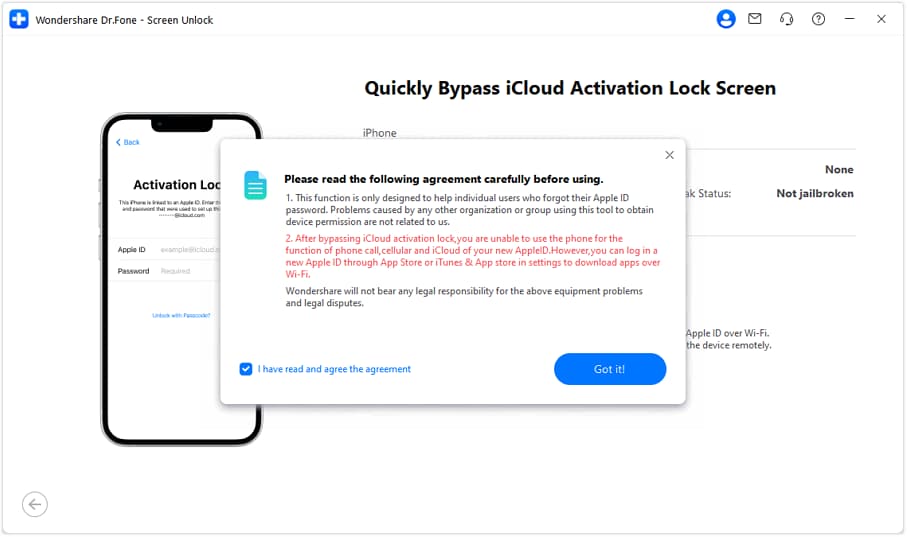
- Step 2. DFU Mode Initiation and Device Unlock
Follow the on-screen instructions to initiate the DFU Mode for your iOS device. Once in the particular mode, the program will send an initial command to the Apple iPhone 8 device, prompting it to restart. Click the right arrow to proceed and repeat putting the iOS device in DFU Mode. Likewise, upon completion, the program will activate and unlock the Apple iPhone 8 device promptly. Finally, click the “Got It!” button to conclude the process.
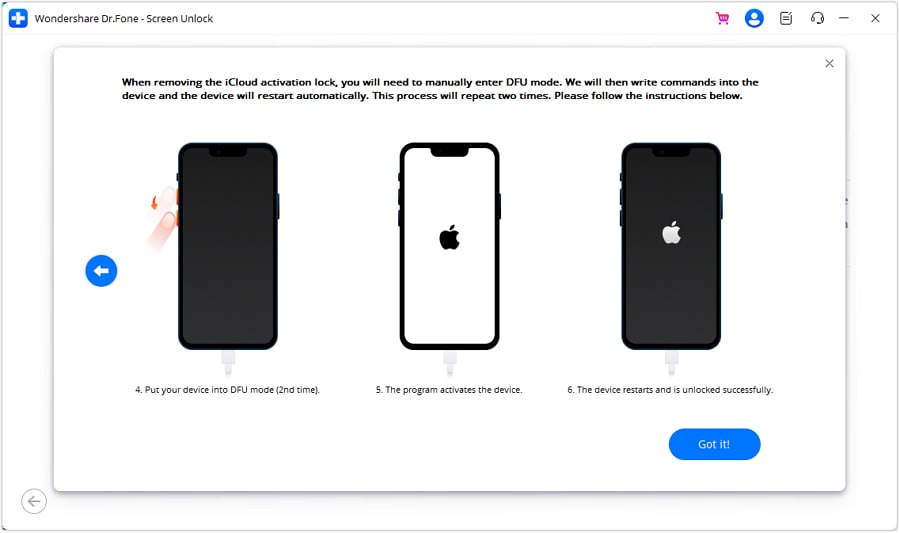
- Step 3. Completion of iCloud Activation Lock Removal
After processing the Apple iPhone 8 device in DFU Mode, Dr.Fone initiates the iCloud Activation Lock removal process. Monitor the progress bar to witness the process’s completion. Once finished, a completion message will appear on the screen. Click “Done” to finalize the removal of the iCloud Activation Lock.
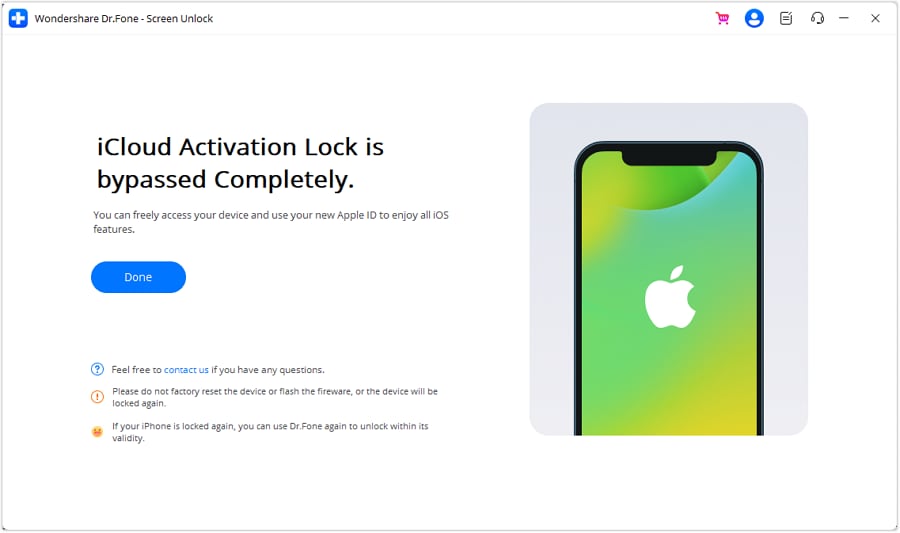
3. For Devices Running iOS/iPadOS 16.4~16.6
For users with devices operating on iOS/iPadOS versions 16.4~16.6, Dr.Fone offers a streamlined approach to removing the iCloud Activation Lock. This solution is crafted to autonomously retrieve and jailbreak your device. This eliminates the necessity for manual interference or the use of third-party apps. Post-jailbreak, proceed with the steps detailed above in the “For Devices Running iOS/iPadOS 12.0 to 14.8.1” section.
Conclusion
Throughout this doctorSIM unlock service review, we explored the different IMEI unlocking services, focusing on doctorSIM as a reliable solution. We covered its legitimacy, user-friendly interface, and efficacy in unlocking devices from carrier restrictions. Additionally, we discussed alternatives for iCloud Activation Lock removal. It emphasizes the uniqueness of tools like Wondershare Dr.Fone bypassing this security feature.
Tips: Are you searching for a powerful iPhone Unlock tool? No worries as Dr.Fone is here to help you. Download it and start a seamless unlock experience!
Apple iPhone 8 Asking for Passcode after iOS 17/14 Update, What to Do?
If you’ve recently updated your iOS iPhone and iPad to the iOS 17/14 operating system, you may notice a bit of a bug where the Apple iPhone 8 displays the passcode lock, even if you haven’t got a security code in place.
This obviously means you won’t be able to access your phone, and in many cases, you’re going to want to get back into your phone as quickly as possible. However, this may be easier said than done. Fortunately, today we’re going to go through multiple solutions to help you get your device working as it should!
Part 1. Don’t try passcodes blindly
One of the worst things you can do when faced with this situation is to enter passcodes blindly. Perhaps you’re trying random numbers and letters, or you’re trying passwords you’ve used in the past. If you get it wrong, you’re going to be locked out of your device for a long time.
The more times you get your code wrong, the longer you’ll be locked out, so avoid doing this at all costs, so make sure you move straight onto these approaches to get your phone working as quickly as possible.
Part 2. 5 ways to unlock iPhone after iOS 17/14 Update
2.1 Try a default passcode in your family
While we said, you shouldn’t type in random numbers to try and guess the password, of course, if you have a standard family passcode that you use across all iOS devices, perhaps an admin password or just something you use for everything, it can be well worth a try.
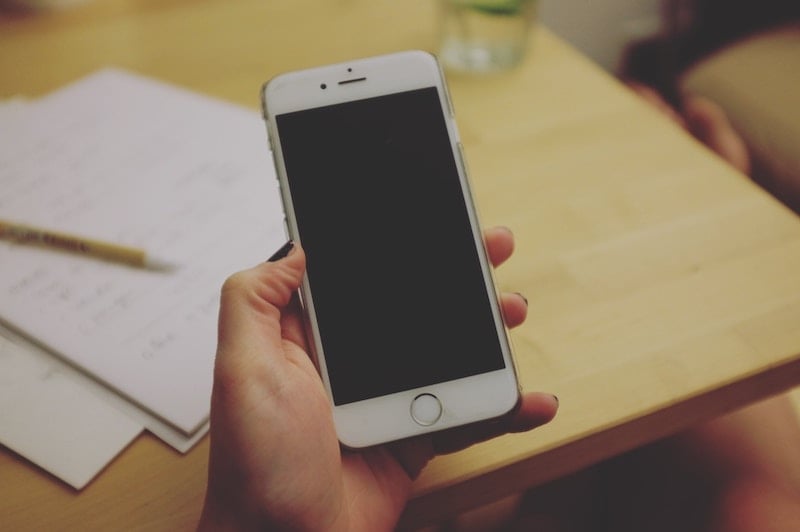
In reality, you get three attempts to put a passcode in before it locks you out, so try two passcodes that your family uses to see whether this will easily unlock your device. If you brought your device preowned and still have contact with the owner, they may have a passcode you can try.
2.2 Unlock iPhone with an unlock tool
The second approach you can take if you don’t know the passcode and can’t get it unlocked is to use a powerful software solution known as Dr.Fone - Screen Unlock (iOS) . This Wondershare software application completely unlocks your phone, even if you don’t know the passcode.
This software is easy to use and incredibly simple, yet it gets the job done. If you’re looking for a quick way to get your iOS device back up and running with full access after an iOS 17/14 update, it doesn’t get much better than this. Here’s how it works;
Step 1. Download and install the Dr.Fone - Screen Unlock (iOS) software to either your Mac or Windows PC and open it, so you’re on the homepage. Connect your iOS device to your computer using the USB cable and wait for the software to recognize your device.
When it does, close iTunes if it automatically opens and clicks the Screen Unlock option from the main menu.

Step 2. Click the Unlock iOS Screen option.
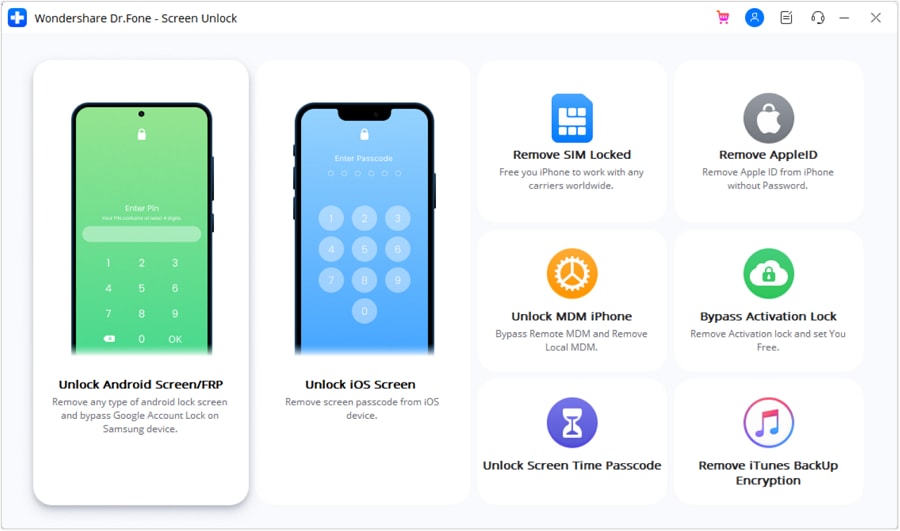
Step 3. You will now need to put your device in DFU mode, also known as Recovery Mode. Fortunately, this is easy thanks to the on-screen instructions where you will hold down the volume down and power button for a few seconds.
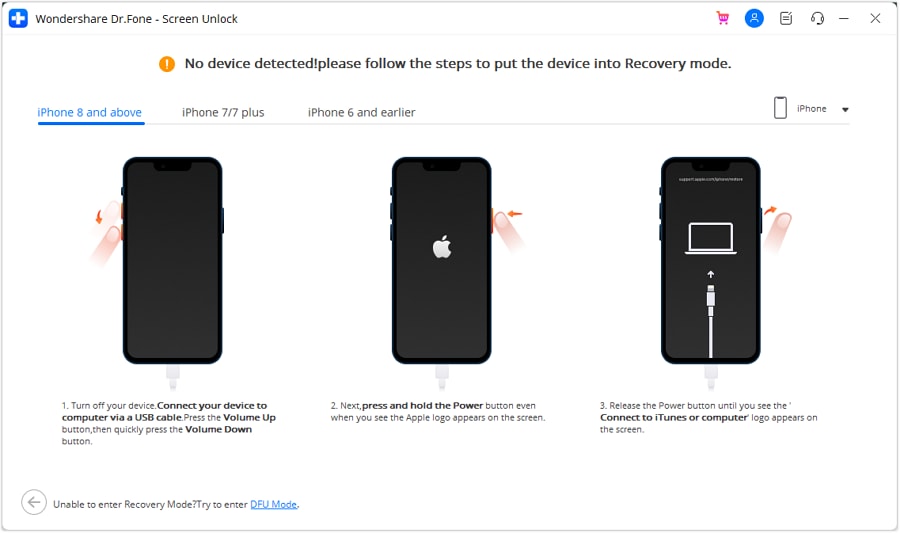
Step 4. Once Dr.Fone - Screen Unlock (iOS) has detected your device in DFU Mode. You’ll be able to select which device you’re using and what firmware you want to be repaired; in this case, iOS 17/14.

Step 5. Once everything has been confirmed and you’re happy to continue, press the Unlock option. The program will do its thing, and when it’s done, the software will say you’re able to disconnect your Apple iPhone 8 and use it without a lock screen!
That’s how easy Dr.Fone - Screen Unlock (iOS) makes the entire unlock process!
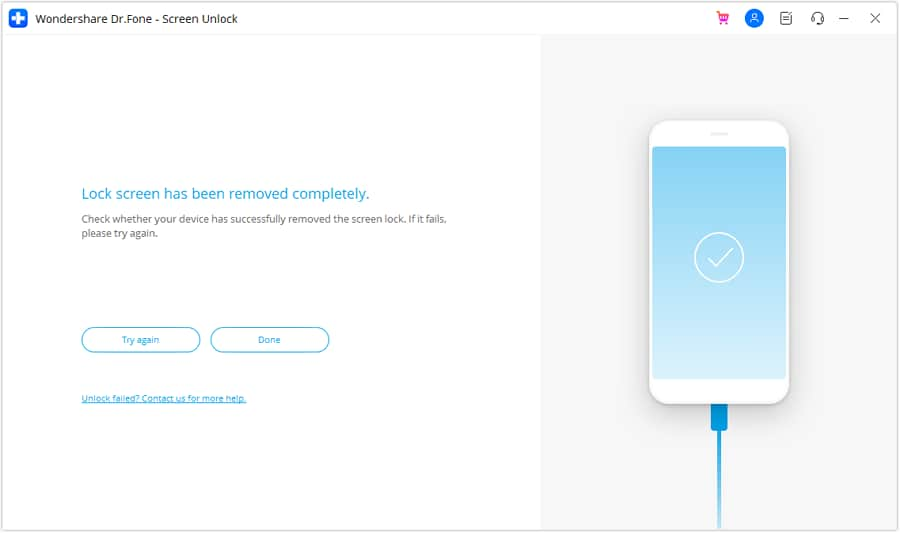
2.3 Restore an old backup from iTunes
Another key way that some users have found to unlock their device after an update is to restore their device to an older version, aiming to put your device back into a position where it didn’t have a lock screen.
It’s only possible to do this if you’ve backed up your iOS device in the past (which is why you’re encouraged to back up regularly), and it can all be done through the iTunes software on either your Mac or Windows computer. Here’s how it works;
Step 1. Ensure you’re running the latest version of iTunes and then connect your iOS device to your Mac or Windows computer using the official USB cable. This should automatically open the iTunes window.
Step 2. In iTunes, click the symbol representing your device and then click Summary. On this screen, you’ll be able to choose the Restore iPhone option at the top to begin the restoring process.
Step 3. Follow the onscreen instructions where you’ll choose which backup file you want to use before iTunes, then restores your device. When the software has completed the process, you’ll be able to disconnect your Apple iPhone 8 and use it without a lock screen!
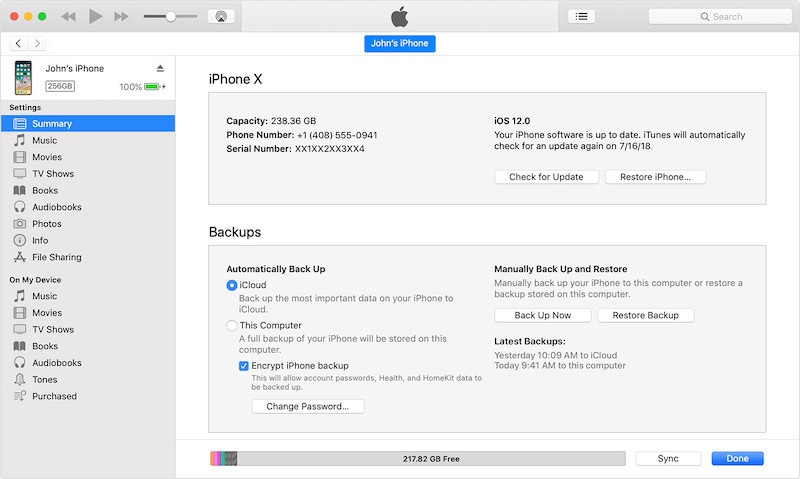
2.4 Restore in recovery mode
In some cases, restoring your device using just iTunes will not be good enough, and it won’t have the effect you’re looking for; in this case, restoring your device with no lock screen after an iOS 17/14 update.
If the above method of restoring your device via iTunes doesn’t work, or you haven’t got a backup file to load, you’ll need to restore your device using a move known as Recovery Mode, or DFU mode. This will hard reset your device and get it working to its full potential.
Here’s how to do it. (Note, the process will differ slightly depending on which model of iPhone you’re using).
Step 1. Press and hold the volume up button for about one second, and then switch and press the Volume Down button for the same amount of time. You can then hold the side button (on devices without a home button), and the following screen should appear after a few seconds.
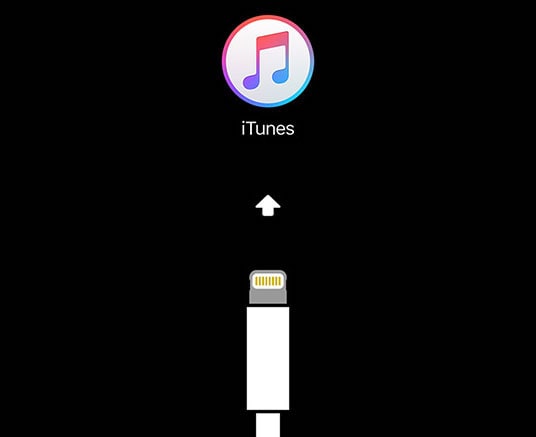
Step 2. Now connect your Apple iPhone 8 to your computer with iTunes and wait for iTunes to open. Make sure you’re running the latest version of iTunes before connecting up your device. Also, make sure you’re using the official USB cable for the most stability.
Step 3. iTunes should automatically detect that your device is in Recovery Mode and automatically restore your device to a default state without a lock screen. Wait until this process is completed before disconnecting your device and using it as normal.
2.5 Use Find My iPhone feature in iCloud
The fifth and final approach you can take to removing a lock screen from your recently updated iPhone or iPad when faced with the iOS 17/14 glitch is taking advantage of the integrated Apple technology and features are known as Find My iPhone.
While this feature originally allows you to literally find your Apple iPhone 8 in the situation where it’s lost and offers many other security features to help ensure your device and data don’t fall into the wrong hands, you can also use it to remove your device unwanted lock screen.
Of course, this will only work if the Find My iPhone features have been enabled in the past, so make sure you’re using it to get it to work. Here’s how to use the feature to get your phone access back.
Step 1. From your computer, iPad, tablet, or mobile web browser, head over to iCloud.com and log into your iCloud account using the login in button at the top of the screen.
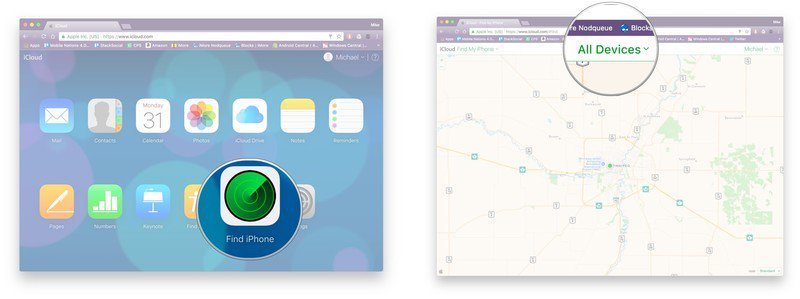
Step 2. Once signed in, scroll down the menu of features and select the Find iPhone feature. Click on the All Devices option at the top.
Step 3. From the list of devices connected to your account, click the Apple iPhone 8 device name with the locked screen and then click the Erase option. This will clear everything from your device, much like the process we’ve spoken about in the methods above.
Leave the Apple iPhone 8 device to erase, and once completed, you’ll be able to pick up and use your phone as normal without a lock screen. You should also now be able to update to iOS 17/14 without any problems!
Summary
And there you go, the five key ways you need to know when it comes to removing an unwanted lock screen from your iOS device after an iOS 17/14 update. We highly recommend the Dr.Fone - Screen Unlock (iOS) since the software makes the whole process incredibly easy, especially when managing any problems you may have on your iOS device!
Also read:
- [Updated] 2024 Approved Dealing with YouTube's Challenging Earnings Model
- [Updated] Ultimate Choices Top Laptops Pro Video Editing in 4K for 2024
- 4 Ways to Unlock iPhone SE (2020) to Use USB Accessories Without Passcode
- Epson Scanner Error: Solutions for Windows 11 Users
- Fixing 'gpedit.msc Not Detected': Enable Group Policy Editor on Windows Home Systems
- How California Drivers Easily Link Their Licenses with Apple and Google Pay - The Ultimate Guide
- In 2024, 3 Easy Ways to Factory Reset a Locked Apple iPhone 14 Without iTunes
- In 2024, 8 Safe and Effective Methods to Unlock Your Apple iPhone 12 Pro Without a Passcode
- In 2024, How To Fix iPhone 7 Unavailable Issue With Ease
- In 2024, How To Unlock Stolen iPhone 14 Plus In Different Conditionsin
- In 2024, Resolve Your Apple iPhone 14 Pro Max Keeps Asking for Outlook Password
- New Top VirtualDub Replacements for Video Editing
- Top-Ranking Smartwatch Reviews of 2024 - In-Depth Analysis by Tech Experts | ZDNet
- Title: Resolve Your Apple iPhone 8 Keeps Asking for Outlook Password
- Author: Sophia
- Created at : 2025-02-12 03:53:50
- Updated at : 2025-02-14 20:17:43
- Link: https://ios-unlock.techidaily.com/resolve-your-apple-iphone-8-keeps-asking-for-outlook-password-by-drfone-ios/
- License: This work is licensed under CC BY-NC-SA 4.0.